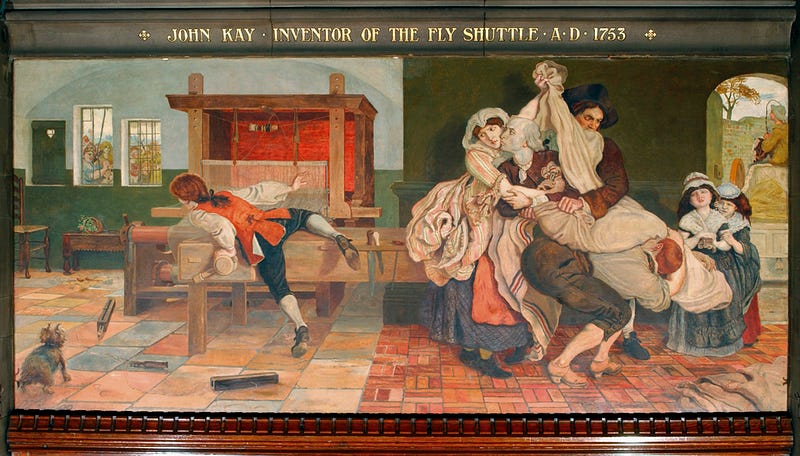Why AI may mean opportunities, not long-term job losses
There’s a lot of speculation about how much AI/ automation could lead to mass unemployment, and all the impacts re. policy, tax, tech etc…

There’s a lot of speculation about how much AI/ automation could lead to mass unemployment, and all the impacts re. policy, tax, tech etc. It seems to be a no brainer now that certain horizontals will be almost entirely automated, and even potentially whole sectors. For my 2-pence, there are two linked points that are reasons to not be too hasty in claiming that long-term high unemployment is inevitable.
Firstly, this is not the first time that technology has threatened to replace humans in an industry, leading to claims that mass unemployment will follow. The example above is a good one — when John Kay invented the “fly shuttle”, which enabled a weaver to weave wider fabrics, and essentially halved the labour required — and there are many others. At some point, commercialisation of the tech may initiate a temporary period of higher unemployment, but it returns to normal in the long term. The key question for people to answer here, is why would the broad pick-up in AI be different to any other new tech?
Secondly, and linked, is that we should be wary of thinking that, because we struggle to conceive of what startups/ industries/ jobs might emerge in the place of these jobs, then it follows that no new jobs will do so. In fact, rather than assuming that no new job-types will emerge, this is actually where real value can be captured by startups, and in turn, VCs — predicting what these new industries might be. As an example, take self-drive cars — yes, jobs will be lost to automation, but just as inevitably, certain industries will expand/ new industries will emerge as we move to wholesale automation. Some examples:
If, as many have suggested, the automotive sector is going to look much more like the aviation sector (splitting out manufacturer and carrier), who will the big carriers be — certainly not necessarily the traditional manufacturers — and how bespoke might they be?
Without the need to drive a car, we should start thinking of the car not first as a traditional vehicle, but first as a room that is mobile. What do people like doing in rooms? Again, like aviation, could we start to see “in car” services, provided by people?
Monetisation of data collected by the car — ownership of which might naturally reside with the vehicle/ fleet owner, rather than the user. Cars will become just another “vehicle” for identifying people’s behaviours and preferences on a macro level. McKinsey reckon this sector will be worth $450–750bn.
What jobs will be required for coordination of fleets (see air-traffic control)?
It might be that these particular industries do not flourish — but some will, as a result of automation of self-driving cars. So AI/ automation will create jobs in places, as well as remove them. What is certain, is that if you’re not thinking about what industries might emerge as AI and automation kick in, you will miss the boat. For now, it is a matter of imagining; in the future, when new industries have emerged, it will all seem inevitable in hindsight.



